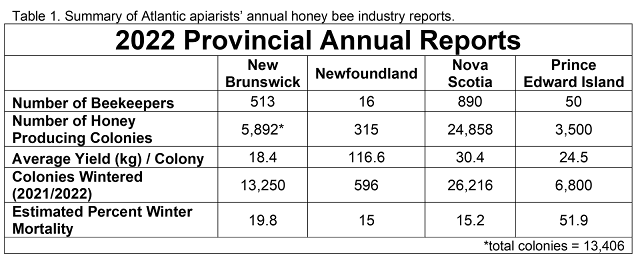At this year’s Canadian Association of Professional Apiculturists (CAPA) annual general meeting, the provincial apiarists from across the country presented a report to relay pertinent beekeeping information from the year past. In this week’s blog, we will overview the key messages from the Atlantic provinces.
A Year in Review for Atlantic Beekeepers
The provincial reports begin with a basic overview of industry statistics. Figures reported for the Atlantic provinces are summarized in the table below. Registering as a beekeeper is mandatory in New Brunswick and Nova Scotia, but not in Prince Edward Island and Newfoundland. As such, the numbers for these two provinces are based on estimates through the experience of the provincial apiarist. These official reports may be conservative figures, as members of the PEI and NL beekeepers associations speculate there is more than 100 and 200 beekeepers in these provinces, respectively. Regulated beekeeper registration will be valuable to gaining insight into the complete regional the honey bee industry. In reporting on the number of honey bee colonies, the distinction of “honey producing colonies” does not include colonies which are exclusively used for pollination services. New Brunswick has many colonies that are managed as such, which is why both figures have been provided. Honey yields were generally average in the 2022 season across the Atlantic provinces. Winter mortality was also relatively normal, which is remarkable given the average overwintering morality coming out of winter in 2022 was high at 45.5% (Ferland, Wilson, and Nasr 2022).
Unusually high overwintering losses this year were primarily
attributed to inadequate Varroa mite control. Prince Edward Island,
unfortunately, did suffer from high winter losses and the majority of
beekeepers have stated this to be the cause. Provincial apiarist, Cameron
Menzies, has gathered that inadequate varroa mite control in the province is
due to improper treatment. Beekeepers treating with partial dosages, for
example. This is an issue for controlling Varroa mite populations in a honey
bee colony but also detrimental for maintaining product efficacy. There is
currently concern about the efficacy of Apivar, our primary miticide used in
Canadian beekeeping, and treating colonies inconsistently with product label
instructions can accelerate mite resistance development.
Varroa mites are by no means a plague for Prince Edward
Island, alone. New Brunswick provincial apiarist, Chris Maund, and Chief Apiary
Inspector, Karen Thurlow, have warned that varroa mites are also the most
significant honey bee health challenge for New Brunswick beekeepers because of
the viruses that they vector, namely chronic bee paralysis and deformed wing
virus. As such, they urge beekeepers to increase varroa mite monitoring to
monthly and even more frequently in the summertime. All Atlantic beekeepers
would be wise to heed this advice.
The good news varroa mite story remains in Newfoundland and
Labrador! Newfoundland beekeeping has increased, and beekeepers have
successfully managed to maintain their unique varroa-free status. Provincial
apiarist, Karen Kennedy, has also reported the province to remain free of
American Foulbrood Disease (AFB) and European Foulbrood Disease (EFB). We can all
help Newfoundland preserve this disease-free status by respecting the honey bee
importation laws. It is illegal to import any honey bees or honey bee products
into Newfoundland without proper authorization, which is extremely limited.
Bees and bee products cannot be imported to Newfoundland and Labrador for
regular beekeeping purposes!
Following regulations regarding honey bee pests and disease is tremendously important for the regional beekeeping industry. Biosecurity in beekeeping cannot be exclusively practiced by a select few producers, but must be practiced by all due to the freedom that is innate to keeping bees. Honey bees can and will travel between apiaries and enter the hives of other beekeepers. Atlantic beekeepers have been doing well to practice regional biosecurity! In 2022, AFB was found in Nova Scotia and PEI, but proper precautions were taken such that the provincial apiarist was notified and able to respond to contain the threat. Likewise, small hive beetle (SHB) was detected in New Brunswick but was managed and the spread contained.
The final pest that was emphasized in these reports was by
the Nova Scotia provincial apiarist, Jason Sproule. Nova Scotia beekeepers reported
excessive shrew damage in 2022, and he expects that their impact was even
greater. Shrews persist across the Atlantic provinces, and proper measures need
to be followed to protect colonies from these predators. For example,
overwintering colonies need to be fastened with a shrew guard while honey bees
have the potential to be in cluster.
Looking back at the year past is a great way to improve
management for the upcoming beekeeping season. Regular monitoring, ongoing
education of pests and disease, and reacting according to best practice will
help the Atlantic Provinces maintain healthy and productive honey bee colonies!
Connecting with ATTTA Specialists


